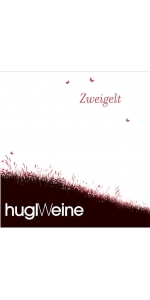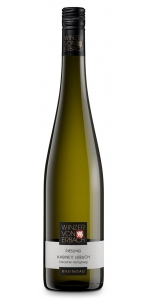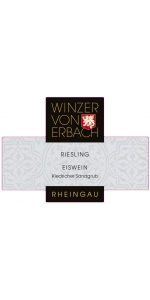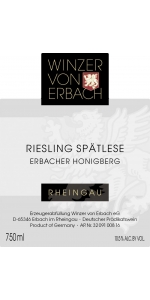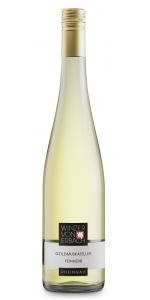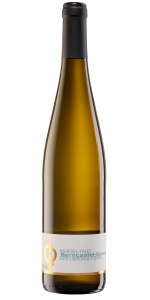Weinkeller Erbach Riesling 2023 (liter)
12 bottles with free shipping for: $204.00
| BUY MORE! SAVE MORE! | ||||||||||||||||
|
| Country: | Germany |
| Region: | Mosel |
| Winery: | Winzer Von Erbach |
| Grape Type: | Riesling |
| Vintage: | 2023 |
| Bottle Size: | 1000 ml |
Weinkeller Erbach Riesling (liter) is 100 percent Riesling.
Round and refreshing wine with light touches of lemon and lime on the nose. Slightly sweet mouthfeel, with juicy and fruity flavors.
The Winzer Von Erbach Estate
The wine-growers association was founded in 1897. Today 45 vintners deliver grapes from the Erbach and Kiedrich vineyards to the cellar. There is close a relationship with the vintners, who are all part owners of their winery, all of whom have access to highly skilled and experienced viticultural advice. The cellar was built in 1903 in the "Art Nouveau" style. Today they are the most highly rated Wine cooperation in the Rheingau region, well known for producing high quality Riesling wines with a strong price-value relationship.
The Winzer Von Erbach Vineyard
Together with the Mosel region, Rheingau is famous for growing top quality grapes of the best German white wine varietal, the Riesling. With 3,200 hectares (7,904 acres) in a 45 kilometer stretch from Wiesbaden to Lorchhausen, it is one of the smaller wine regions in Germany.
More than 30% of their vineyards are located in the top spots of the Rheingau called "erstes Gewächs" (first growth). 50 hectares are cultivated in the following locations in Erbach and Kiedrich: Erbacher Michelmark: (12 hectares), Erbacher Steinmorgen: (8 hectares), Erbacher Honigberg: (20 hectares), Kiedricher Sandgrub: (10 hectares).
Wimmer Zweigelt Classic is made from 100 percent Zweigelt.
This variety was created in 1922, when Dr. Fritz Zweigelt crossed two grapes - St Laurent and Blaufrankisch.
The wine boasts a deep and concentrated red color. It offers fruity, fresh and spicy aromas, cherry flavors. In the mouth it is smooth, medium-bodied, round and lively.
Malolactic fermentation. Aged 50% stainless steel, 50% oak barrels just for maturation (size 3000 liters).
Full-bodied, smooth and round, the wine is an ideal food companion.
Wimmer Zweigelt Classic is made from 100 percent Zweigelt.
This variety was created in 1922, when Dr. Fritz Zweigelt crossed two grapes - St Laurent and Blaufrankisch.
The wine boasts a deep and concentrated red color. It offers fruity, fresh and spicy aromas, cherry flavors. In the mouth it is smooth, medium-bodied, round and lively.
Malolactic fermentation. Aged 50% stainless steel, 50% oak barrels just for maturation (size 3000 liters).
Full-bodied, smooth and round, the wine is an ideal food companion.
Winzer Von Erbach Riesling Rheingau Erbacher Honigberg Kabinett is 100% Riesling.
This Riesling Kabinett shows hints of apple, citrus and peach and is mineral - scented.
The purity of fruit aroma combined with a unique and delicate fruit acidity makes this Riesling to a typical ambassador of one of the greatest grape varieties in the world.
Pairs well with gorgonzola, blue cheeses and pastas in a creamy sauce.
Winzer von Erbach Riesling Eiswein is made from 100 percent Riesling.
The Eiswein has aromas of concentrated yellow fruit and a fruity sweetness. It's a high end product with a very long aging potential.
The grapes were picked frozen which resulted in a concentration of sugar, acidity and aromas and a low yield.
Pairs with blue cheese, fois gras, French apple cake.
Honeyed style, rich minerality and luscious creaminess. Flavors of baked pineapple and pear. Fresh and juicy on the finish.
From the famous Erbacher Honigberg vineyard. Average of the vines is 20 years old.
Cool fermentation, matured on the lees for 2 months before bottling, with a slight filtration.
Riesling Rheingau Erbacher Honigberg Spatlese goes well with Indian Curry and blue Cheese
Winzer Von Erbach Goldmuskateller Rheingau Feinherb is 100% Goldmuskateller.
The old name for the Erbacher Honigberg was Wachholderwiesen-juniper meadows.
At the Wachholderwiesen there was an uprising of the peasants in the 16th century, all of the ringleaders were hanged.
The muskateller has a smell of elder-berries, apricots and quince, aftertaste of nutmeg.
Winzer Von Erbach Goldmuskateller Rheingau Feinherb is 100% Goldmuskateller.
The old name for the Erbacher Honigberg was Wachholderwiesen-juniper meadows.
At the Wachholderwiesen there was an uprising of the peasants in the 16th century, all of the ringleaders were hanged.
The muskateller has a smell of elder-berries, apricots and quince, aftertaste of nutmeg.
Bastgen Berncastel-Cueser Weisenstein Riesling Spatlese Trocken is made from 100 percent Riesling.
Bright, clean, fresh and zesty. Grapefruit like flavors. Fruity aromas and a nice minerality, typical of the Riesling grape grown on blue slate soil. Round, rich and a very long finish. The grapes for this wine are vigorously selected. Botrytis is not tolerated. At harvest the grapes are fully ripened, have a golden color, and a soft tartness. After a long spontaneous fermentation in a traditional 1000L barrel, the wine just reaches the dry stage. This gives the wine a creamy structure that interplays with ripe yellow and exotic fruit aromas.
They meticulously tend 4.5 ha (11.11 acres) of which 80% is Riesling. The soil is made of slate. Their vineyards are located in Kesten and Brauneberg, on a steep terrace, and planted to 50-year old vines. Fortunately for Bastgen, they own part of the famous Brauneberger Juffer Sonnenuhr. The vines produce very small, ripe berries that are very tasty.
- back
La Despensa Boutique Sangiovese is made from 100 percent Sangiovese.
There's really very little Sangiovese in Chile. It was an educated gamble to plant this variety in La Despensa little corner of Colchagua and the team is thrilled with the results.
This Sangiovese is a fresh and fruity take on a classic Italian variety, but with the typical savoury notes of tomato and cherry. Perfect for early drinking, but will improve for many years to come.
This vineyard is situated at over 3,000 feet in altitude in Valle de Uco, and the vines are over seventy years old. This light soil is sandy with some silt, is very permeable and has boulders and a broken layer of limestone at a depth of 2.5 feet. Traditional irrigation is fed by water from the Andes Mountains. Temis has the coldest climate of all Alta Vista’s terroirs. Nights are quite cool and days are warm and soft, with constant breezes that help to keep the vines and grapes healthy. The grapes have a slow, gradual cycle of ripeness that is balanced and ideal. Planted in 1942, the selection massale vines are characterized by small clusters with small, compact grapes.
Review:
There’s a touch of bark, grilled Mediterranean spice savoriness to the rich but fresh blackberries, salted black plums and graphite notes. Pretty saline and flavorful on the palate. The tannins are powerful yet fine-grained. A structured and characterful malbec from old vines in El Cepillo.
-James Suckling 94 Points


